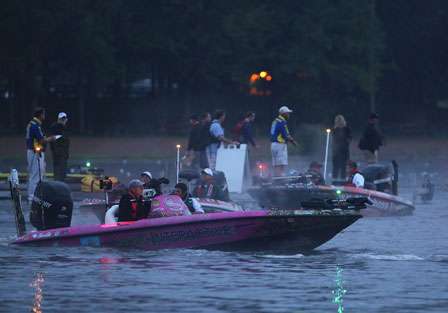
SYRACUSE, N.Y. — The last three times BASS has traveled to New York's Oneida Lake, the winners have seemingly come from every place other than the northeast.
Oklahoma's Tommy Biffle won in 2006. Florida's Peter Thliveros won the Major in 20 07. Dean Rojas of Arizona won last year's Elite Series showdown.
If the first day of this year's Ramada Champion's Choice is any indiccation, the shutout will continue.
At the completion of the first day of competition, Thliveros sits in fourth, Biffle is in fifth and Rojas is well within striking range at 22nd. A dead fish penalty dropped the defending champ five places in the standings.
They're all ahead of the top northeastern contender, Dave Wolak, who currently resides in North Carolina but grew up and lived until recently in Pennsylvania and has substantial experience on Oneida. The next northeasterner after Wolak in the standings is Mike Iaconelli of New Jersey, in 43rd. The two other "locals," Matt Sphar, the only New York resident in the field, and Mark Burgess of Massachusetts, are in 68th and 83rd, respectively.
Iaconelli said that after four tour-level trips to the lake, any local advantage that may have exised the first year has dissipated.
"The guys have gotten better at catching largemouths here," he said. "A hundred guys come here with fresh eyes every year. Most of them try to fish it like a new lake each time. I try to do that, too. Of course you look at a little bit of your history but you try to fish fresh each time."
While any home-field advantage may be gone, Iaconelli said that he still enjoys the tour's northeastern events.
"The northeast is where I cut my teeth bass fishing," he said. "Growing up, I fished two small lakes in New Jersey, Hopatcong and Greenwood, that were smaller versions of this lake, so it feels comfortable."
Biffle, who exposed the occasionally awesome Oneida largemouth bite to a national audience, has come full circle, and entered practice this year with the "fresh eyes" that Ike described. He caught a quick limit of smallmouths in the first 15 or 20 minutes, then culled all but two of them out with larger green fish.
"Back (in 2006) it was just me and one or two others who were fishing for largemouths," Biffle explained. "Now we've been here four years and I feel like I know pretty much where all of them live." The problem is not locating the largemouths – it's having enough of them to last four days, and with the increased pressure he believes that will be tougher than ever to keep up.
Rojas, on the other hand, thinks the largemouth bite will get better, at least for him. "I'm doing what I do best," he said. "I know what it takes to win so had to leave a few areas today. I've got to save them for days two, three and four."
He hasn't made a cast for smallmouths, either in practice or during the tournament, and said that the prevailing weather patterns will prove that strategy to be prophetic.
"When it got real hot (today), it got really good," he said. "It's getting warmer and those largemouths are coming. As it gets hotter and hotter it gets better and better. Everything is just coming alive."
At the same time, he believes the pressure on those increasing numbers of largemouths will decrease as anglers get frustrated. It's tough to stay on a pattern that may produce only a bite an hour when the possibility of dozens of biting smallmouths sits only a short boat ride away.
"I think a lot of the guys are leaving," he said. "You have to cover a lot of water and you can go a long time between bites."
For much of the weigh-in, Thliveros' 5-6 largemouth led the big bass race before being overtaken by Chad Griffin's 5-8. That single fish, joined by a quartet of quality smallies, was enough to push Peter T into fourth place. Oddly enough, he was targeting smallmouths at the time and caught it on his first flip into a spot that's been a proven smallmouth producer.
"It proves that it can be any flip, any cast, any bite it can happen," he said. "It was completely unexpected. It was a gift and I'll take it."
The gift may keep on giving because it got the wheels spinning in his head. He caught another largemouth doing the same thing on a spot where he'd previously caught a big one. The second one didn't help his cause today, but it gives him the confidence to fish that pattern a little more going forward. He noted that this particular largemouth pattern doesn't involve ultra-shallow water.
"I caught it in 10 feet of water on a Zoom Super Hog between 1:30 and 2 o'clock in the afternoon," which no doubt provided him a huge sigh of relief. At 10:30 a.m. he had only two fish in the livewell.
While the northeasterners have yet to assert themselves this year, Floridians including Thliveros have made their presence known. Fellow Sunshine staters Bernie Schultz (tied for 10th), Shaw Grigsby (28th), Bobby Lane (tied for 35th) and Terry Scroggins (46th) are all inside the money cut. Chris Lane, in 65th, is only 13 ounces outside of the check line.
The success of the Florida anglers here doesn't surprise Wolak, who said "This lake is the Okeechobee of the north."
Thliveros agreed: "New York and Florida have a lot of similarities in the way that the grass edges set up." Time will tell whether past success or any amount of local knowledge will help Oneida veterans rise to the top of the heap as the competition progresses.

